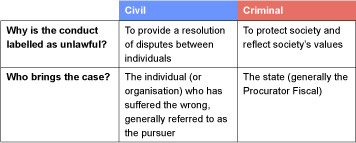1.1 Classification of unlawful conduct
Classification of unlawful conduct into civil or criminal helps determine whether the case will be heard in the civil justice system or the criminal justice system. This is important as there are significant differences between these two systems. These include:
- the rules on who may bring a case
- the rules on who may sit in judgment in a case
- the time limits in which the case must be brought
- how the case may be funded (paid for)
- the procedure for bringing the case
- rules on the evidence that can be used and considered
- which court will hear/try the case and where any appeal can be made
- the remedy/punishment available
- what legal terminology is used.
Box _unit3.2.1 Box 1 The distinct parts of the Scottish justice system
The justice system in Scotland is split into two distinct parts: the criminal justice system and the civil justice system.
The distinction between the two parts of the system is as follows: the criminal justice system exists to prosecute, or otherwise deal with, those who commit crimes. On the other hand, the civil justice system exists to give people and organisations a way to protect and enforce their legal rights and to regulate disputes in respect of those rights. Each part of the Scottish justice system has its own courts and processes for dealing with cases and appeals.
Standard of proof
One of the major differences between the systems of civil and criminal justice is the standard of proof. The standard of proof is the level to which a legal case must be proven. The standard of proof is a concept. It means that the pursuer or prosecution has to provide evidence to a certain standard before the case against the defendant can be proved. The standard of proof differs from the burden of proof. The burden of proof is a concept used to indicate which party to the legal case has to prove a factual point in support of their claim or defence.

